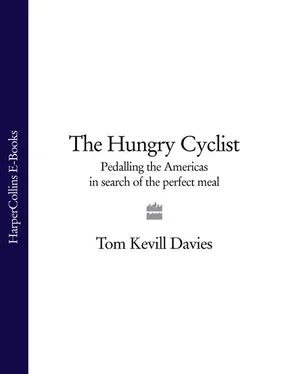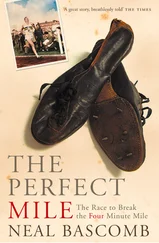Like after any good museum visit, I found myself in the shop browsing for postcards, novelty pens, key fobs, moccasins and dream catchers, but to my excitement I also discovered a traditional Ojibwa recipe book. Until now the only regional dish I had found that Ontarians were at all proud of was poutine, a clumsy bastardisation of a French dish, consisting of a heap of greasy chips, topped with lumpy gravy and some rubbery cheese curds, normally sold from the hatch of a converted ambulance and served on a flimsy polystyrene platter. It had all the charm and sophistication of a late-night kebab. So to browse recipes of such exotic treats as beaver tail soup, boiled moose nose, white fish livers and manoomin (wild rice) was an exhilarating experience. As I left, the kind woman who sold me the book called after me to tell me that the Sagamok Anishinabek annual traditional pow-wow was being held at the weekend, and if I was lucky I might well be able to taste some of this traditional native fare.
Following the north shore of Lake Huron, I cycled deeper into the barren landscape of Ontario. Small one-café towns, surviving on the logging industry, provided well-needed breaks from the never-ending tarmac of Highway 17, romantically known as the TransCanada Highway. After two days I turned off this noisy road, which flowed with fume-belching logging trucks and made happy time along the pothole-infested back roads that wound their way under towering russet rockfaces and along the banks of placid lakes. Riding in silence, apart from my heart beat and the whoosh of my spinning wheels, I was alone. My imagination, overfed on Spaghetti Westerns, began to work overtime. I peered up at the cliffs flanking the roads and squirmed at the haunted calls and ominous shapes of the patient turkey vultures circling overhead. Rocks tumbling down precipices were no doubt misplaced by the warring redskin scouts who crept up on their bellies, primed to puncture me with arrows, and I could see the angular features of ancient warrior chiefs in every shadow and rock formation that surrounded me.
An hour before sunset I was still thirty miles away from where I hoped I would find my pow-wow and so decided to call it a day and cover the rest of the distance in the morning. A couple of miles along a disused, rust-stained railway track I hit on a good spot to camp, perched above the steep, rocky banks of Silver Lake. Hot and dirty after a day in the saddle, I stripped off, scrambled naked to the lake’s edge and plunged into the cold clear water for a resurrecting swim. Before darkness fell I had failed to catch a fish for supper, but I had gathered enough wood for a small fire and prepared some lentils that had been soaking in one of my water bottles since the morning. The fire kept out the crisp chill of night and under a clear sky I lay back alone in this vast landscape. The mocking laughter of loons echoed across the calm waters shimmering in the moonlight. At long last my bicycle was giving me real freedom, allowing me to find this perfect place, but after a month on the road I felt alone. For the first but not the last time I began to wish I had someone to share it with. It seemed a waste having it all by myself.
At sunrise I restarted my fire, brewed some coffee and cooked some oats before packing up, clicking my panniers into place and returning to the road. I did my best to make good time, before it got too hot, on a twisty road that ran between jagged rockfaces and thickets of tall pine. It wasn’t until midday that I caught a glimpse of another human being. He was perched behind the wheel of a rusty old pick-up and wore a black felt hat that covered his long dark hair, which was stretched tight over his ears and gathered in a tidy ponytail behind. I offered a raised hand of acknowledgement, but the angular native features of the man did not flinch and he rolled slowly past until the mechanical clanking of his engine disappeared into the silence. Minutes later a beaten-up station wagon stuffed with several generations pulled alongside. Its occupants peered at me from the windows with blank, unwelcoming expressions.
SACRED GROUND OF THE OJIBWA SAGAMOK. STRICTLY NO DRUGS AND NO ALCOHOL.
Following the two vehicles I arrived at a clearing of dry, yellow grass on a small hill that looked out across the endless waters and small islands of Lake Huron. It may well have been sacred. It was certainly beautiful. A cool breeze swept off the lake and mingled in the leaves of the slender trees that cast long shadows towards the back of the clearing, where a line of twenty or so rusty vehicles was parked in the shade.
In the centre of this sacred ground a busy group of men and women were constructing some kind of circular shelter from felled trees. Their work filled the afternoon with the energetic sounds of hammering, chopping and sawing, but they stopped, one by one, and put down their tools to look at the English cyclist standing nervously under his Union Jack flag. I looked on, questioning whether I should be here. Eventually, after what felt like an eternity, a large-framed man approached me. He was dressed in tired blue jeans and a black T-shirt with a wolf’s face peering out from the middle.
‘You’re here for the pow-wow?’ he asked in a deep and flat tone. ‘Camp over there. No drugs. No alcohol. The grand entry begins at seven.’
Still feeling the stares of a hundred pairs of eyes, I wheeled my bike clumsily towards a shady cluster of trees where a few more nylon domes had already been erected, and picked a good spot with a beautiful view across the waters of Lake Huron. I got my tent up quickly. I had become good at it, just like the little man in the instruction manual, and I got a strange sense of satisfaction out of being organised and efficient. By now it was the middle of the afternoon and, after making the most of a small picnic of two squashed bread rolls, a tomato and some uninspiring packaged ham, I lay back on the soft grass, rested my head on my rolled-up sleeping bag and shut my eyes. With the warmth of the sun on my face I began to enjoy my weekend.
‘If you need to wash I am going to the lake.’
A deep voice woke me from my blissful slumber. I opened my eyes to the vision of a large bare-chested Indian towering over me holding a towel and a bar of soap. Without his wolf T-shirt it took me a few moments of sleepy confusion to recognise the man casting a long shadow across my body. He turned and walked away. I gathered the pathetic piece of material that had been sold to me as a quick-dry camping towel and jogged to catch up.
‘My name’s Tom.’
‘John,’ he replied. I had half expected him to be called Jumping Salmon or Silver Wolf.
I followed him in silence along a dusty tree-lined track to a small beach on the reedy, marshy banks of the lake. Our arrival was announced by a pair of ducks that burst out of a cluster of wild rice and scrambled across the surface of the water before taking off and flying into the distance. John took off his jeans, his white trainers and untied his ponytail. Standing naked, his long dark hair, which had been pulled in a smooth dome over his head, fell around his thick neck and muscular back like a curtain. He waded into the water and, after muttering some form of blessing, quietly sank his large frame beneath the surface, sending out no more than a few soft ripples. I peeled off my clammy Lycra, got out of my whiffy T-shirt and, feeling shamefully naked, quickly scuttled into the shallows. We both swam a little and the cool water seemed to wash away not only the dust and sweat of the last week’s cycling, but also my tiredness and uncertainty. In an attempt to break the silence and show off the knowledge I had recently gained in the museum, I asked, ‘What does the word “ojibwa” mean?’
‘In the language of Ojibwa it means to pucker.’
Читать дальше












